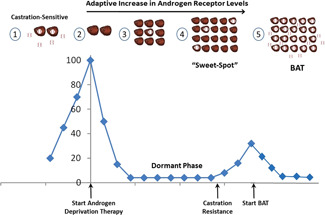Figure 2.

Prostate cancer is initially highly sensitive to ADT. (1) AR levels in castration‐sensitive prostate cancer cells are relatively low. Androgen receptor “glove” is bound to androgen “ball.” (2) Androgen deprivation removes androgen, leaving receptor empty. This produces an initial beneficial effect: PSA levels drop, symptoms improve, and the tumor shrinks. (3) The surviving prostate cancer cells then enter a dormant phase. Then they begin to increase production of levels of the androgen receptor “glove.” (4) Eventually, these cells reach a “sweet spot” where they have made enough glove to start growing again despite low testosterone levels in the blood. At this point prostate cancer cells are considered castration‐resistant. How can we shake up the cancer? (5) BAT floods the system with androgen “balls” resulting in too much AR bound to androgen, moving the prostate cancer cell away from the “sweet‐spot” and inducing growth inhibition and prostate cancer cell death. ADT, androgen deprivation therapy; AR, androgen receptor; BAT, bipolar androgen therapy; PSA, prostate‐specific antigen. [Color figure can be viewed at wileyonlinelibrary.com]
